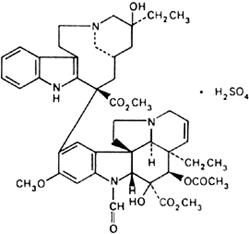Monographs: Pharmaceutical substances: Vincristine sulfate (Vincristini sulfas)
Molecular formula. C46H56N4O10,H2SO4
Relative molecular mass. 923.0
Graphic formula.

Chemical name. Leurocristine sulfate (1:1) (salt); 22-oxovincaleukoblastine sulfate (1:1) (salt); CAS Reg. No. 2068-78-2.
Description. A white to slightly yellow, amorphous or crystalline powder; odourless.
Solubility. Freely soluble in water; slightly soluble in ethanol (~750 g/l) TS; practically insoluble in ether R.
Category. Cytotoxic drug.
Storage. Vincristine sulfate should be kept in a tightly closed container, protected from light, and stored at a temperature between 2 and 8°C.
Additional information. Vincristine sulfate is hygroscopic and very toxic. CAUTION: Vincristine sulfate must be handled with care, avoiding contact with the skin and inhalation of airborne particles.
Requirements
Definition. Vincristine sulfate contains not less than 95.0% and not more than 105.0% of C46H56N4O10,H2SO4, calculated with reference to the dried substance.
Identity tests
• Either tests A and D or tests B, C and D may be applied.
A. Carry out the examination as described under 1.7 Spectrophotometry in the infrared region. The infrared absorption spectrum of the substance dried under reduced pressure for 16 hours at 40 °C is concordant with the spectrum obtained from vincristine sulfate RS similarly prepared or with the reference spectrum of vincristine sulfate.
B. See the test described below under "Related substances". The principal spot obtained with solution A corresponds in position, appearance, and intensity with that obtained with solution C.
C. To about 1 mg add 0.2 mL of vanillin/hydrochloric acid TS and allow to stand for approximately 1 minute; an orange colour is produced (distinction from vinblastine sulfate).
D. A 20 mg/mL solution yields reaction A described under 2.1 General identification tests as characteristic of sulfates.
Loss on drying. Dry at 40 °C under reduced pressure (not exceeding 0.6 kPa or about 5 mm of mercury) for 16 hours; it loses not more than 120 mg/g.
pH value. pH of 1.0 g/mL solution, 3.5-4.5.
Related substances. Carry out the test as described under 1.14.1 Chromatography, Thin-layer chromatography, using silica gel R2 as the coating substance and a mixture of 40 volumes of toluene R, 20 volumes of chloroform R, and 3 volumes of diethylamine R as the mobile phase. Apply separately to the plate 5 μl of each of 3 solutions in methanol R containing (A) 10 mg of the test substance per mL, (B) 0.20 mg of the test substance per mL, and (C) 10 mg of vincristine sulfate RS per mL. After removing the plate from the chromatographic chamber, allow it to dry in air, and examine the chromatogram in ultraviolet light (254 nm). Any spot obtained with solution A, other than the principal spot, is not more intense than that obtained with solution B.
Assay. Dissolve about 10 mg, accurately weighed, in sufficient methanol R to produce 500 mL. Measure the absorbance of this solution in a 1-cm layer at the maximum at about 297 nm and calculate the content of C46H56N4O10,H2SO4, using the absorptivity value of 17.7 ( = 177).
= 177).